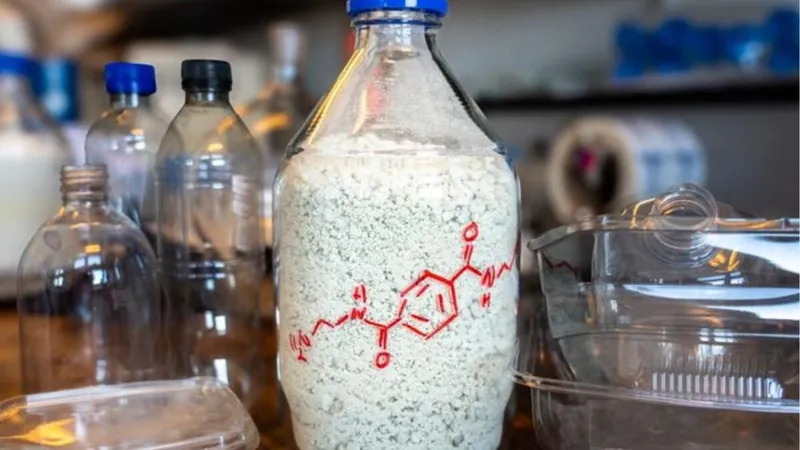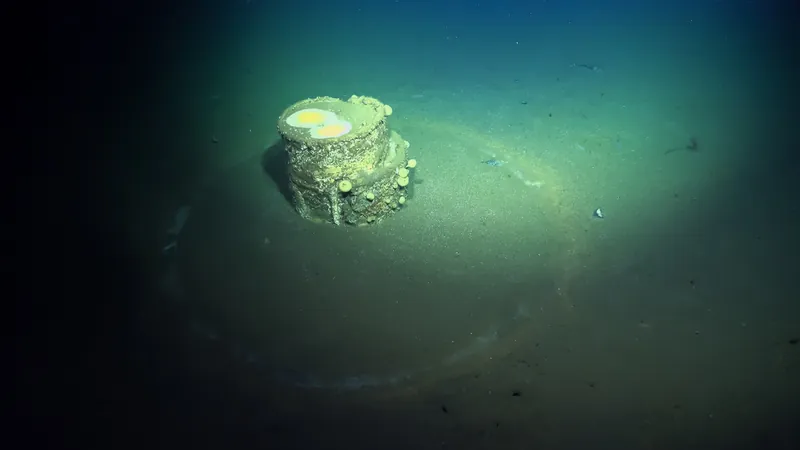
Revolutionary Breakthrough: Plastic Waste Transformed into a Carbon-Eating Powerhouse!
2025-09-08
Author: Chun
Imagine a world where plastic waste not only disappears but actively fights climate change! This dream is now a reality thanks to innovative scientists in Denmark who have unveiled a groundbreaking method to convert decomposed plastic into a carbon capture material.
With nearly 2 billion tons of greenhouse gases spewed into the atmosphere each year due to plastic production and disposal, the stakes couldn't be higher. Most of this plastic ends up in landfills, contributing to a global environmental crisis. But what if we could repurpose that trash into a tool that combats climate issues?
In a stunning study published on September 5 in *Science Advances*, a brilliant team led by chemistry PhD candidate Margarita Poderyte has done just that by transforming PET (polyethylene-terephthalate) plastic, commonly used in bottles and food packaging, into a powerful carbon-capturing agent known as BAETA.
"The beauty of this method is that we solve a problem without creating a new one," Poderyte stated. This innovation could be key in addressing two overwhelming global challenges: rising carbon emissions and rampant plastic pollution.
A Double-Edged Solution to Global Woes
As climate change accelerates, the urgency to reduce carbon dioxide levels has never been more pressing. Conventional strategies focus on cutting emissions, but scientists are now looking into proactive measures to remove CO2 from the atmosphere. Simultaneously, the alarming rise of microplastics threatens both human health and ecosystems.
The researchers aim to tackle these dual crises with BAETA, which is made via a chemical reaction called aminolysis. This method efficiently repurposes PET plastic into a sorbent that excels at capturing carbon dioxide.
Remarkably, one pound of BAETA can absorb up to 0.15 pounds of CO2, making it significantly more efficient than many commercial alternatives. Furthermore, BAETA boasts exceptional heat-resistance, maintaining stability even at high temperatures of up to 482 degrees Fahrenheit (250 degrees Celsius), albeit with a higher energy requirement for optimum carbon absorption.
Harnessing the Ocean's Plastic Plague
Did you know that millions of tons of PET plastic waste linger in our oceans? Recent discoveries have unearthed around 27 million tons of floating plastic particles in the North Atlantic alone, with their ecological impact still largely unknown.
Poderyte offers a glimmer of hope: "If we can access the decomposed PET plastic floating in our oceans, it's an invaluable resource ideal for our upcycling process." BAETA not only addresses the climate crisis but also sets its sights on cleaning our oceans.
Co-author Jiwoong Lee emphasizes the interconnectedness of these issues: "We’re not talking about stand-alone problems, nor will the solutions be." This innovative material could spark significant economic incentives to rid our oceans of plastic pollution.
This bold research opens up new possibilities for environmental sustainability. By transforming waste into a resource, we can take meaningful steps toward restoring balance on our planet.




 Brasil (PT)
Brasil (PT)
 Canada (EN)
Canada (EN)
 Chile (ES)
Chile (ES)
 Česko (CS)
Česko (CS)
 대한민국 (KO)
대한민국 (KO)
 España (ES)
España (ES)
 France (FR)
France (FR)
 Hong Kong (EN)
Hong Kong (EN)
 Italia (IT)
Italia (IT)
 日本 (JA)
日本 (JA)
 Magyarország (HU)
Magyarország (HU)
 Norge (NO)
Norge (NO)
 Polska (PL)
Polska (PL)
 Schweiz (DE)
Schweiz (DE)
 Singapore (EN)
Singapore (EN)
 Sverige (SV)
Sverige (SV)
 Suomi (FI)
Suomi (FI)
 Türkiye (TR)
Türkiye (TR)
 الإمارات العربية المتحدة (AR)
الإمارات العربية المتحدة (AR)